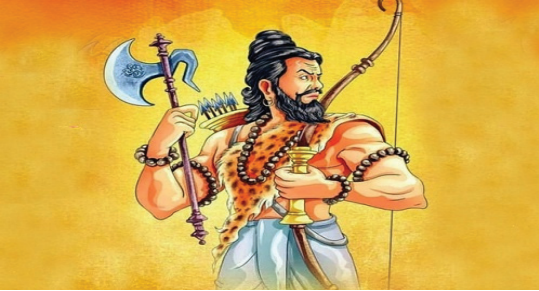
Introduction
Bhagwan Parshuram, the sixth avatar of Bhagwan Vishnu, is revered across India as the warrior sage who held the Parshu (axe) and stood for justice. Known for his dual mastery in Shastra (weapons) and Shaastra (scriptures), Parshuram’s story is a timeless inspiration on righteous resistance and the defense of Dharma.
1. Birth of a Warrior Sage
Born to Rishi Jamadagni and Renuka Devi of the Bhrigu lineage, Parshuram was a Brahma-Kshatriya—a Brahmin by birth and Kshatriya by duty. He trained in martial arts under Lord Shiva, who gifted him the divine axe that defined his identity and mission.
2. The Turning Point – Sahasrabahu’s Attack
As a young boy in his Gurukul, Parshuram witnessed the demon king Sahasrabahu destroy his peaceful ashram. His father’s passive response inspired Parshuram to question the logic of non-resistance. This experience planted the seed for his belief in armed self-defense when Dharma is under threat.
There comes across an anecdote whilst he was in childhood and studying in the Gurukul of his father Maharishi Jamdagni, an unprovoked deadly attack was launched on the the Rishi’s Gurukul by a powerful demon of that era namely Sahasrabahu who ransacked it at will and fled away without confronting any resistance from the students and the management of Gurukul, inclusive of Maharishi Jamdagni.
Young Parshuram went to his father and raised a query, “Dear father, this Gurukul is functioning under your supervision, moreover, you are imparting education to the pupils, both in moral education as well as martial arts, archery and all other weapons. You do have mastery over usage of the weapons. Then why didn’t you confront that rascal though you possessed the skill and competence to defeat him on his provocation? Why didn’t you kill him for the ultimate good of the humanity?
Mahrishi Jamdagni politely replied, “I am a Teacher. My duty is to teach and train students in fighting skills and diligently educate them all other religious and spiritual scriptures. Using weapons is not within my purview.”
Tiny Parshuram screamed in anger and said, “This is totally unfair and illogical. This is contrary to our right of self defence. If we do not change, it would spell death and destruction for all of us and the Gurukul as well. Certainly that demon will come again and raze Gurukul to the ground.”
3. The Slaying of Evil Kings
After Sahasrabahu murdered his father and stole the divine cow Kamadhenu, Parshuram exacted justice by killing him. He didn’t stop there—he eradicated 21 generations of corrupt Kshatriya rulers, restoring balance in society and filling the Samant Panchaka with their blood.
4. Master of Shastra and Shaastra
Parshuram is the only figure in Hinduism who perfectly embodied both spiritual wisdom and martial strength. He wielded scriptures and weapons alike, symbolizing that true righteousness includes both intellect and action.
5. Parshuram the Mentor
He trained legendary warriors such as Bhishma, Dronacharya, and Karna. Through them, his warrior ethics and discipline were carried into the epic tales of the Mahabharata. His teachings underline that Karma (duty) surpasses caste or birth in importance.
6. Renunciation and Spiritual Wisdom
After fulfilling his mission, Parshuram renounced violence and became an ascetic. He retired to the Mahendragiri Mountains in Odisha, where he is believed to still reside, awaiting his return to train the final avatar, Lord Kalki.
7. Parshuram’s Legacy Across India
- Janapav Hills (Madhya Pradesh): His birthplace
- Parshuram Kund (Arunachal Pradesh): Where he washed away the sin of killing his mother
- Parshuram Mahadev Temple (Rajasthan): His cave for Shiva worship
- Konkan and Kerala: The lands he reclaimed from the sea by throwing his axe
Conclusion
Bhagwan Parshuram is much more than a mythological figure—he’s a symbol of divine justice, righteous resistance, and inner discipline. On this Parshuram Jayanti falling on Akshaya Tritiya, let us remember his life’s message: Dharma must be defended—not just with wisdom, but with courage.
Jai Bharat. Jai Bhagwan Parshuram!









